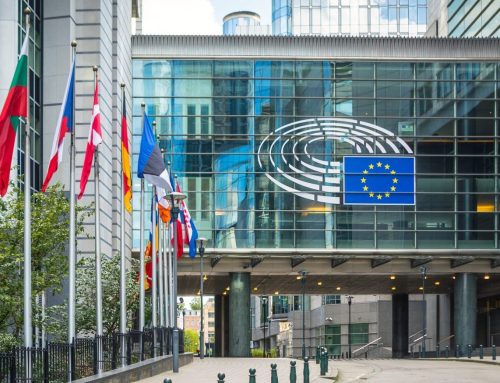Russia
Monitored Russian accounts tweeted 17,875 times last week, pulling in 200,445 retweets and 613,214 likes.
Russian propagandists reacted to Ukraine and Moldova earning EU candidate status by arguing that the bloc was building a war-like coalition against Russia, while at the same time downplaying Ukraine’s chance of becoming an EU member state and highlighting rifts within Europe. Russia’s Foreign Minister Sergey Lavrov compared the EU’s potential enlargement to the coalition that “Hitler rallied… for a war against the Soviet Union.” “Nazi Germany” became one of the ten most used key phrases by Russian diplomats. State media and officials also argued the EU’s “unbridled expansion” was a means to “contain” Russia. At the same time, Kremlin-linked accounts said Ukraine’s candidate status was a “consolation prize” and a “PR stunt” by a political bloc going down “a wrong and dangerous path.” State-funded outlets insisted that Ukraine is “by no means suitable” for the EU and “has nothing to be happy about” since it wouldn’t be able to meet the union’s criteria. They also claimed that other EU candidate states felt “cheated and discouraged” by Ukraine’s status. One RIA Novosti writer argued that “Europe betrayed Georgia” by not offering the same candidate status to Tbilisi.
Kremlin-affiliated accounts also attacked the G7 and NATO in response to summits held by both groups this week. The most retweeted post about the G7 said its leaders were a collection of “supposedly responsible and influential people” that “resembles schoolchildren.” Russian propagandists argued that the “utterly clueless” and divided G7 was “directly responsible” for the war in Ukraine and the reason for global inflation. UK Prime Minister Boris Johnson was mocked for suggesting leaders take off their shirts to look tougher than Russian President Vladimir Putin. NATO received similar treatment. RT en Español published a primer on the alliance ahead of its summit, which called NATO an “armed, extractive, a bloodthirsty military organization.” One state media contributor retweeted a post that called NATO the “armed wing of capitalism” and highlighted the expenses of the summit. Other Moscow-linked accounts showed Madrid, where the meeting is being held, as militarized and filled with anti-NATO protesters.
Propagandists also continued pushing familiar wartime narratives. They painted Western solidarity as “a deception” that has failed to defeat Russia in Ukraine. Officials pushed back on accusations that Moscow was weaponizing gas and food. More egregiously, diplomats argued that news of Russian forces bombing a Ukrainian shopping center was “a Bucha-style” provocation by Ukraine and a site linked to Russian intelligence suggested a possible Russian invasion of Lithuania. As usual, Russia was shown helping Ukrainian refugees and being surrounded by international allies.
Outside of Ukraine, Russian media emphasized the divisive U.S. Supreme Court ruling that stuck down the constitutional right to an abortion. “Abortion” and “Supreme Court” were the two most frequently used key phrases in Russian tweets that mentioned the United States. NewsFront, a Russian intelligence-linked site, described the court’s decision as opening “a window of opportunity for the most radical scenarios.” Other outlets showed extreme reactions from pro-choice activists: people burning American flags and screaming “I f*cking love killing babies.” Radio Sputnik commentator Lee Stranahan retweeted a series of radical posts from the infamous Libs of TikTok account, which is known for mainstreaming anti-LGBTQ+ disinformation. Another state media contributor said the decision was meant to cause riots and distract from how Biden “ruined their [American’s] economy and laundered billions to Ukraine.” Sputnik also showed right-wing figures—including former President Donald Trump and Fox News host Tucker Carlson—celebrating the court’s move.
China
Monitored Chinese accounts tweeted 23,200 times last week, pulling in 155,435 retweets and 642,749 likes.
As has become routine, the United States was the main focus of China’s external messaging on Twitter last week, registering more than twice the mentions of Russia and Ukraine combined. Ministry of Foreign Affairs spokesperson Zhao Lijian ridiculed inflation in the United States, while the MFA’s official account accused NATO of warmongering. The juxtaposition of a supposedly constructive China with a destructive West was conveyed with the slogan “The US bombs, and China builds,” variations of which were shared by Zhao Lijian and the Consul General in Belfast, among others. The Consul General in Zanzibar also posted a TikTok video about China bringing water to an African village that received a high level of engagement. Additionally, Assistant Minister of Foreign Affairs Hua Chunying shared a survey showing declining trust in “the overall state of moral values in the US.”
The Supreme Court decision to overturn Roe v. Wade also received significant attention, with the terms “Supreme Court” and “abortion” registering as the second and third most popular key phrases last week in Tweets mentioning the United States. Hua Chunying shared a Washington Post article denouncing the US Supreme Court decision to overturn Roe, adding that the United States protects unborn children but tolerates the shooting of children in schools. Similar criticism came from the ambassador to Cyprus, the ambassador to Qatar, and other Chinese diplomats. The Consul General in Belfast highlighted global opposition to the decision, while the head of China Daily in Europe slammed European politicians for criticizing China while refusing to condemn their American allies. Chinese state media’s analysis of the decision ranged from condemnation of the Supreme Court’s partisanship to sensationalized depictions of chaos and violence in reaction to the decision.
The British decision to deport Julian Assange to the United States was also criticized by Chinese diplomats, including the Ministry of Foreign Affairs, Consul General in Belfast, Hua Chunying, and the former ambassador to the United Kingdom, and state media outlets and affiliated individuals like the Global Times, the head of China Daily in Europe, and Xinhua. Many Chinese messengers referred to the case as a “mirror” reflecting the hypocrisy of the West’s defense of press freedom, seemingly borrowing a metaphor coined during the MFA’s Monday press conference.
Attempts to denigrate the West coincided with a concerted push to promote the BRICS grouping as a viable alternative, with BRICS2022 registering as the most used hashtag and key phrase last week. The head of China Daily in Europe asked whether the G7 or BRICS “should represent the global community” given that BRICS countries have more than three times the population of countries in the G7. The Global Times was more explicit in its analysis, stating, “The BRICS Summit sent a strong signal to the world that […] non-Western major economies […] can effectively represent the majority of the international community.” Hua Chunying promoted BRICS as a venue respectful of participants’ “core interests” that avoids “hegemony [and] bullying,” a clear shot at the United States. The Chinese embassy in Brazil suggested that BRICS countries would be the ones to pull the world out of its current economic slump, and the head of China Daily in Europe attacked the SWIFT sanctions placed on Russia, arguing that they condemned Africa to starvation. CGTN also questioned whether BRICS countries could “make a contribution to international security.” The BRICS summit was also the subject of roughly 15 percent of CGTN and CGTN America videos posted to YouTube last week, with much of the content focusing on BRICS global development efforts.
Explore the Hamilton 2.0 Dashboard.
The views expressed in GMF publications and commentary are the views of the author alone.







